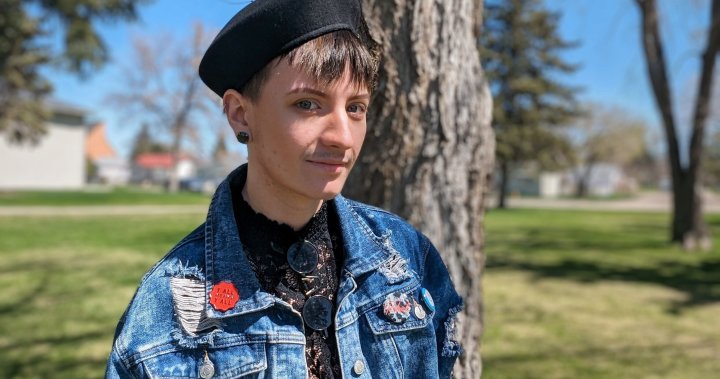Blake Tait, a transgender man, shares his experience of being outed by his school’s guidance counselor at the age of 14, leading to a tumultuous journey of self-acceptance and healing. Despite his parents being supportive, his mom’s ex-husband, with whom they lived at the time, subjected him to emotional abuse, which culminated in a suicide attempt. Tait expresses how crucial his school was as a safe space where he could be his authentic self, emphasizing the damaging impact of the proposed change room policy by Saskatchewan Party Leader Scott Moe. Tait, along with other LGBTQ+ advocates, condemns the campaign promise as hateful and threatening to the well-being of transgender youth, highlighting the importance of maintaining safe environments for them.
The Saskatchewan Party’s pledge to ban “biological boys” from sharing change rooms with “biological girls” has sparked controversy and outrage among LGBTQ+ advocates, who view it as discriminatory and detrimental to the safety of transgender youth. NDP Leader Carla Beck accuses Scott Moe of fueling fear and division among voters and further endangering vulnerable children. The promise follows the passing of a law by the Saskatchewan Party government, requiring parental consent for children under 16 to use different names or pronouns at school. Beck vows to repeal the law if her party wins the provincial election, arguing that it undermines children’s rights to express their gender identities.
Heather Kuttai, a mother of a gender-diverse child and a former commissioner with the Saskatchewan Human Rights Commission, criticizes Scott Moe for exploiting transgender children as an “easy target” for political gain. She condemns the rhetoric used by Moe as harmful and insensitive, emphasizing the importance of recognizing and valuing the rights of trans adults and children. LGBTQ+ advocacy groups, such as Prince Albert Pride, express distress and frustration over the proposed change room directive, highlighting the potential risks and dangers it poses to transgender and two-spirit youth. They argue that forcing trans girls to change with teenage boys could result in increased vulnerability to assault, sexual assault, and bullying.
The debate over the change room policy brings to light the broader issues of inclusivity, safety, and acceptance for gender-diverse individuals in society. Blake Tait emphasizes that such policies serve as distractions from essential election issues like healthcare and have long-lasting effects on the well-being and existence of queer and trans individuals. He stresses the importance of recognizing and affirming LGBTQ+ individuals’ contributions to society, rather than erasing their identities through discriminatory legislation. Tait calls for support and understanding for gender-diverse youth, insisting on the need for safe spaces where they can thrive and be their authentic selves without fear of prejudice or harm.
The political discourse surrounding transgender rights and the proposed change room policy underscores the ongoing challenges faced by gender-diverse individuals in accessing inclusive environments and adequate support. Advocates like Blake Tait emphasize the resilient spirit and contributions of LGBTQ+ communities to society, urging policymakers to prioritize their well-being and rights. The debate highlights the critical need for education, awareness, and advocacy to create welcoming and affirming spaces for all individuals, regardless of their gender identity. Ultimately, the voices of LGBTQ+ advocates and allies play a crucial role in shaping policies and attitudes that promote equality, respect, and dignity for all members of society.


